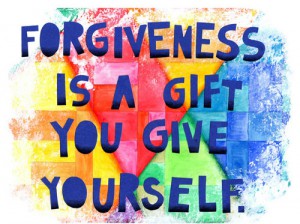A Year of Choices…
By Barbara Dahlgren from Barbara’s Banter at www.barbdahlgren.com
 Studies show that those who master the art of forgiveness live longer, healthier lives. This means that psychologists, doctors, and scientists are embracing an idea considered mostly theological in the past.
Studies show that those who master the art of forgiveness live longer, healthier lives. This means that psychologists, doctors, and scientists are embracing an idea considered mostly theological in the past.
According to the Mayo Clinic here are just a few of the health benefits of forgiveness…
- Healthier relationships
- Greater spiritual and psychological well-being
- Less anxiety, stress and hostility
- Lower blood pressure
- Fewer symptoms of depression
- Lower risk of alcohol and substance abuse
- Stronger immune system
- Less negative emotions like anger, bitterness, and resentment
So everyone agrees that forgiveness is good. However, in the words of C.S. Lewis, “Everyone says forgiveness is a lovely idea, unless they have something to forgive.” In other words, it is easier said than done.
It might be easier to embrace the concept of forgiveness if we understand that forgiveness is not necessarily the following: forgetting, reconciling, or restoring. These may come in time after forgiveness, but are definitely not instantaneous. God admonishes us to forgive (Colossians 3:13, Ephesians 4: 32, Luke 17:4), but he does not tell us to trust the untrustworthy, condone unchristian behavior, let everyone walk all over us, or prevent accountability. These perceived misconceptions can block an attitude of forgiveness.
On the other hand, forgiveness is not earned. Many of us play the “if only” game. We think we would forgive someone “if only” they would apologize or admit what they did. But that’s not how forgiveness works. In fact, many people we might need to forgive may never acknowledge they’ve done us wrong. Yet, we forgive them anyway.
Forgiveness relinquishes our right to retaliate, get even, seek revenge, or have an “eye for an eye” mentality.
Now on the surface forgiveness appears to be a selfless act, but it really isn’t because forgiveness is a gift we give ourselves as well as others. Sometimes the person we are forgiving doesn’t even know it. Sometimes a person knows it but doesn’t care. It doesn’t matter. For in relinquishing this “right” we trade caustic, self-destructive elements such as anger, resentment, and bitterness for peace. We can cross over from being a victim to being a survivor. We can get on with our lives. We can stop the past from dictating our present or future. As Lewis Smedes puts it, “To forgive is to set a prisoner free and discover that the prisoner was you.”
Consider this…All of us at one time or another have had someone betray us, hurt us, emotionally wound us, or do us wrong. So humanly speaking we think we have a justifiable “right” to hurt back or retaliate. When we forgive, we relinquish that “right.” We let God take care of any vengeance he thinks should take place. (Romans 12:19-21) We trust God to take care of it in his way and in his time.
Forgiveness is the first step on a journey to healing. It doesn’t happen overnight. It’s a hard and sometimes long process but truly worth the effort. Fostering forgiveness benefits not only our physical life but our spiritual and emotional well-being as well. Forgiveness is a win/win situation. When we do it for others, we are really doing it for ourselves.
Suggestions for practicing this choice…
Think about this formula when you are struggling with the process of forgiveness. I read this a few years ago, cut it out, and use it for reference often. The first letter of each bullet point spells out the word forgive. It’s taken from the article The Freedom of Forgiveness by Florence MacKenzie in the magazine Just Between Us, summer edition 2011.
- Face the fact that withholding forgiveness feeds anger, bitterness, and resentment.
- Openly admit these feelings to God.
- Remind yourself that God, in Christ, has forgiven you.
- Give up your right to pay back your offender.
- Invite the Holy Spirit’s help as you begin the process of forgiveness.
- View your offender as one whom God will deal with justly.
- Embrace the freedom that forgiving your offender brings.


